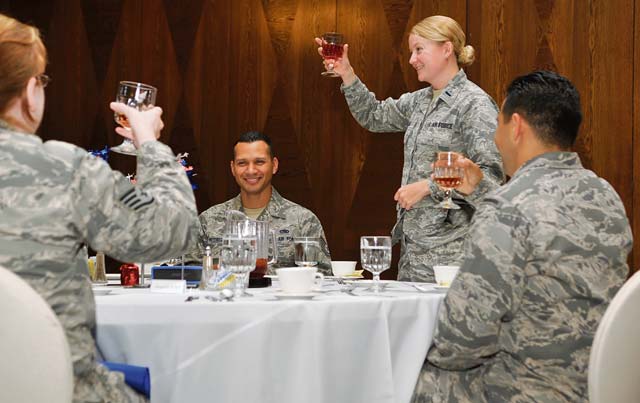
First Lt. Amara Adams, 39th Air Base Wing chief of protocol at Incirlik Air Base, Turkey, demonstrates how to formally give a toast during the Protocol Fundamental Course simulated retirement luncheon Aug. 1, 2014, at Ramstein Air Base, Germany. The course attendees learned to manage many aspects of protocol to include ceremonies, distinguished visitors and fine dining etiquette.
Professionalism, flightline etiquette, flag etiquette, event logistics, ceremonies, gifts, distinguished visitors, fine dining etiquette, precedence and financials are just a few of the topics that were discussed during the course.
The Protocol Fundamental Course prepared protocol members for tasks they may be a part of in the future, as well as better their skills to enable them to do their jobs to the best of their abilities.
“A lot of times people are thrown into the protocol world without training, and they can make or break a situation,” said 1st Lt. Amara Adams, 39th Air Base Wing chief of protocol at Incirlik Air Base, Turkey. “For me, the purpose of this course was to help me become the subject-matter expert on courtesies and ceremonial requirements so that I can translate this to my wing commander and he can effectively develop those vital international relationships.
“This course has helped me understand my role, grow my knowledge base and primed my confidence for executing my requirements,” she continued. “I am taking back knowledge on specific items we have done incorrectly for some of our ceremonies, and I am more prepared for our distinguished visitors.”
For some, it was a refresher; for others, it was a learning experience.
“The course helped tremendously even though I am not currently working protocol for my unit,” said Marine Corps. Master Sgt. Thomas Kay, Special Operations Command Africa executive assistant to the command sergeant major. “I learned a lot from this course.
“This is my first professional military education course with Air Force members; I was the only other branch of service in attendance,” he continued. “The experience of learning alongside them and seeing how they operate was great.”
Some may not understand the extent of certain career fields they aren’t as familiar with. A protocol member may be seen polishing the bases and spades of a flag.
Why are the little tedious things important? Adams added that it’s all about honor and relationship building.
“We honor the men and women who gave their lives for the freedom that the flag represents; so it matters how the flag is displayed because it is more than a piece of material on a pole,” Adams said. “We care about opening a DV’s door because it is courtesy.
“Additionally, some cultures place more importance on rank and position,” she continued. “We can inadvertently insult a guest by not knowing a custom or their order of precedence, which leads into the last piece; it does matter where people sit at a dinner table. It matters not only for rank importance but for socializing and political reasons as well. Looking at today’s world events, how comfortable would Russian and Ukraine leaders be if we placed them together? Details matter. I trust my senior leaders to work toward solving today’s issues, but I can certainly help set them up for success by knowing my job.”
Protocol focuses on patience, flexibility, attention to detail and upholding the core values.
“My career field is ultimately a bridge between manpower, personnel and services,” Adams said. “Simply calling ourselves personnelists does not accurately depict what we do. We are the support team who focuses on taking care of the people. Here we uphold expected traditions and impact senior leadership relationships.”
A variety of individuals attended the Protocol Fundamental Course; NCOs, senior NCOs and company grade officers from different bases as well as civilians. Each attendee has different levels of experience from very little to years.
The course, set up by the United States Air Force Air Education and Training Command Eaker Center, was unit funded but open to anyone
in USAFE.


